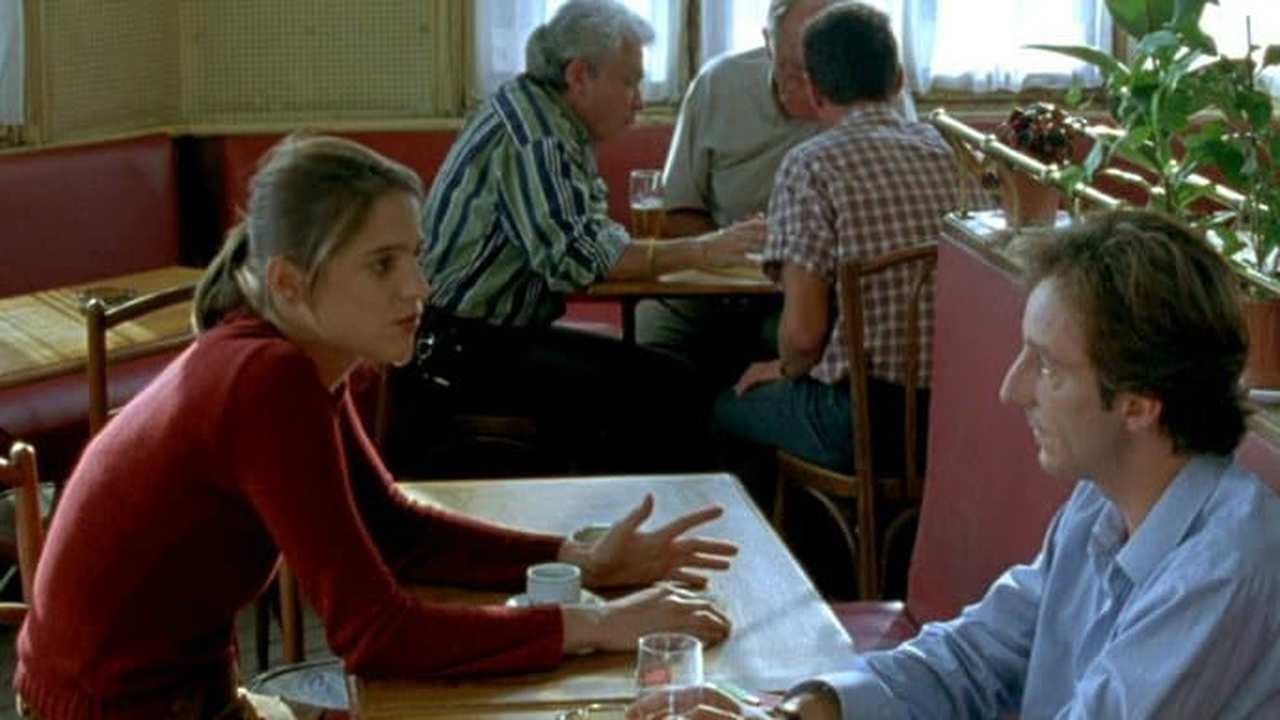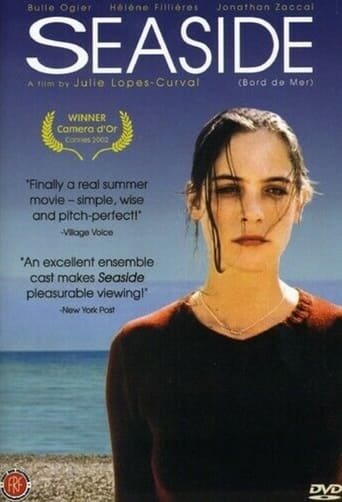Laikals
The greatest movie ever made..!
NekoHomey
Purely Joyful Movie!
Arianna Moses
Let me be very fair here, this is not the best movie in my opinion. But, this movie is fun, it has purpose and is very enjoyable to watch.
Stephanie
There is, somehow, an interesting story here, as well as some good acting. There are also some good scenes
Chris Knipp
I just watched Lopes-Curval's new 2014 film High Society/Le beau monde as part of Film Comment Selects at Lincoln Center and this led me to go back and re-watch her 12-years-earlier Seaside/Bord de mer (2002), twice; it is available streaming on Netflix. The two films have this common interest in class, a provincial place someone chooses to leave, and couples splitting up, but they are completely different. I think I like this one, her first feature, winner of the Caméra d'Or at Cannes, better than the new one; it seems more original and shows a keener eye. As viewers have noted this film seems to be about nothing, but in fact is finely observed, with many subtle little moments in the life of this minor resort town with its pebble factory. As Lopes-Curval's new film, High Society/Le beau monde (2014) also shows, she's interested in class, and how a woman may move up and couples may split up along the way. At the outset Paul (Jonathan Zaccaï) and the pretty Marie (Hélène Fillières) are together but Marie is bored with sorting pebbles and with Paul. Rose (Bulle Ogier), Marie's mother, retired from the factory, is a compulsive gambler at the local casino pouring all she has into slot machines. Rose avoids Odette (Liliane Rovère), whom she resents for marrying into the factory owner family (but the factory was failing and Odette's husband sold it). Odette's ineffectual son Albert (Patrick Lizana) works in management at the factory but without motivation or ability. He is married but is attracted to Marie. In the course of the year (the film divided up into seasons from "Été" to Été") these relationships between Marie and Paul, Albert and Marie, Rose and Odette, will shift. We also follow people who come only in the summer; one is a fashion photographer who grew up here but has never thought of using the pebble beach as a background for a shoot till now: people are expected to go far to achieve in his field. Lopes- Curval flats around the little seaside town like Jacques Tati in Jour de Fête, but focusing on feelings and lives not physical comedy. This is the portrait of a place and a little society. It doesn't seek to go into depths about any individuals. But there are crises -- Rose's gambling; Marie's desperation. The film ends comically with a unifying event: a shark alert, like in Jaws, Lopes-Curvas thus wryly pointing to how completely her film eschews overt drama in favor of delicate portraiture that is too low-keyed even for many French tastes. Yet perhaps just for that reason this is a film that continues to yield up its charms on repeated viewings, its lack of any big events making all the little moments of heightened value.There is a warm an detailed appreciation by Michael Atkinson from the Village Voice when the film, following a Rendez-Vous with French Cinema showing, had a New York theatrical release in 2003. He concludes: "Scores of other characters come and go—including a fashion photographer, his blissfully dim girlfriend, and his lovely, increasingly anxious mother (Ludmila Mikaël)— but we see them only in random cross sections. The changing of the seasons leaves some of the town's inhabitants gone, some pregnant, some resolved to shoulder their burdens; we are not necessarily privy to the changes or how they came about. We do get subtle gestures and evaporating moments: a mother looking with fondness and worry after her son, a tug on an uncomfortable dress, a cocktail drained too quickly, a decision to hold one's tongue visualized as an eyebrow flex."It's a gently sensible strategy that dares to suggest, as Renoir, Ozu, Rohmer, and Kiarostami films do, that you can only know so much about other people by watching them, and that our small 'knowing' says as much about us as it does about the subjects of our attention. Certainly, Hollywood films encourage us to enjoy an absurd God-like omniscience; all relevant thoughts, incidents, and connections are made plain as day. In her first feature, Lopes-Curval lets the human mysteries play out invisibly, and even the actors are forced to economize in short scenes of little dramatic import. A stare held a split second too long or an evaded gaze can mean the world."
paulscofield68
I happened to be living in France when this film was released back in 2002. It had received lukewarm reviews. So, to my surprise and delight, I enjoyed it far more than I'd expected. In terms of its strengths, the acting/casting/direction are all well done (and the story is nearly like a soap opera in that it follows different individuals and couples very loosely connected with each other (if at all). They all live or are on vacation in a small seaside town on the French Atlantic coast. In my opinion, the screenplay is the single strongest aspect of this film; and although some might say that all French films are "indie" from the American perspective (which is not so), this film most definitely has an indie feel to it. The soundtrack, for one, is an indie-type soundtrack. At times, I was reminded of the American indie film "You, me, and everyone we know"...in terms of style (visually, Seaside is not as strong; but in terms of storytelling, it's every bit as strong). Seaside, too, has a lot to say about modern relationships, and it does it across a number of couples (not 1) and there are numerous valuable insights. But it's not merely about relationships; it also deals intelligently with work, social class, and addictions, among others. Finally, Seaside does an excellent job of capturing the modern French woman who's in her 50s or 60s (wholly outside of romance). Yes, this film is "typically French," but these are just the type of French films that I find truly satisfying...Thanks to all involved, and enjoy.
atxj
The degradation of small town life is becoming quite common all across the Western world, especially in parts of the Midwest here in America. The movie is pretty much an unforced examination of the economic stagnation of a small coastal town. If you like picking out subtle nuances you might like this film. I identified most with the main female character. She is young, vivacious and is stuck sorting rocks all day. The characters that surround her, especially her boyfriend's mom, are especially interesting. It is human nature to give into one's weaknesses and this is a theme that is often explored in French cinema.
plaidpotato
Films about the mundane are often the most interesting of all films to me, in the hands of an insightful artist who examines all the twisted little details of the mundane. The French cinema seems to often be very good at this sort of thing, and I love the French cinema.This film was about the mundane. It didn't have a much of a plot. It was just characters who lived in a town, very normal people, and stuff just happened. But it wasn't very interesting stuff, and it wasn't examined very insightfully. The film did capture a bit of a mood, but it wasn't a particularly captivating mood. And while I can't think of much that the film did specifically wrong, it failed on just about every level to do anything right.There were a lot of characters in this film. A lot of them kind of looked alike, so it was hard to figure out who was who, and what were their relations to one another. I don't mind putting some effort into understanding a film, or even watching an especially complex film more than one time to iron out the details, but this one was a puzzle not worth the solving for me.The only good thing I can really say about this film is that the cinematography was pleasant--functional, not brilliant, but pleasant. The camera often captured some nice postcard-type shots. But it rarely found the really interesting little details.I've seen a handful of not-so-good films so far at the Seattle International Film Festival, but this was the only one that failed to get any applause when the credits rolled. I sensed a big collective sigh of relief when the film was finally over. But I suppose there are probably some people out there who would like it.4/10

